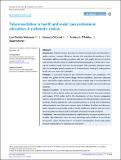Files in this item
Teleconsultation in health and social care professions education : a systematic review
Item metadata
| dc.contributor.author | Wetzlmair, Lisa | |
| dc.contributor.author | O'Carroll, Veronica | |
| dc.contributor.author | O'Malley, Andrew Stephen | |
| dc.contributor.author | Murray, Stuart William | |
| dc.date.accessioned | 2022-07-28T11:30:15Z | |
| dc.date.available | 2022-07-28T11:30:15Z | |
| dc.date.issued | 2022-10-01 | |
| dc.identifier | 280559126 | |
| dc.identifier | bb534c4b-2447-4127-8fb3-c1f7a96325bd | |
| dc.identifier | 35898157 | |
| dc.identifier | 85135120730 | |
| dc.identifier | 000831096500001 | |
| dc.identifier | 35898157 | |
| dc.identifier.citation | Wetzlmair , L , O'Carroll , V , O'Malley , A S & Murray , S W 2022 , ' Teleconsultation in health and social care professions education : a systematic review ' , The Clinical Teacher , vol. 19 , no. 5 , e13519 . https://doi.org/10.1111/tct.13519 | en |
| dc.identifier.issn | 1743-4971 | |
| dc.identifier.other | ORCID: /0000-0002-5862-9691/work/116910343 | |
| dc.identifier.other | ORCID: /0000-0001-5777-104X/work/116910376 | |
| dc.identifier.other | ORCID: /0000-0001-7725-4082/work/143917034 | |
| dc.identifier.other | PubMedCentral: PMC9544545 | |
| dc.identifier.uri | https://hdl.handle.net/10023/25738 | |
| dc.description | Funding: University of St Andrews, School of Medicine. | en |
| dc.description.abstract | Introduction Teleconsultation education in health care and social work education is under-reported. However, literature indicates that educating the workforce in teleconsultation skills is essential to continue with safe, high-quality delivery of services and increases the likelihood of implementing teleconsultations in health care. Training for students should, therefore, be encouraged. This systematic literature review aims to investigate global experiences of teleconsultation training in undergraduate health care and social work education. Methods A systematic review of peer-reviewed literature was undertaken. The review was guided by the Joanna Briggs Institute guidelines. Electronic databases were searched for eligible evidence. Studies were included only if they described and evaluated teleconsultation education for undergraduate health care and social work students. Results/Discussion This review shows that mandatory education in teleconsultation is limited in undergraduate health care and social work education. Narrative synthesis and analysis of 14 studies led to the development of two themes: pedagogical aspects, and perspectives on telecommunication and teleconsultation learning and teaching. Practical experiences with simulated patients or during clinical placements with real patients were the most common mode of delivery. Feedback on teleconsultation education was generally positive; overall, health care students felt more confident using teleconsultation and valued safety of learning through simulation. Conclusion Teleconsultation education is a legitimate way to expose students to telehealth. High satisfaction rates, increased knowledge and confidence in use indicate the positive impact this learning has on students. Nevertheless, further high-quality research and guidance for educators are warranted. | |
| dc.format.extent | 13 | |
| dc.format.extent | 990264 | |
| dc.language.iso | eng | |
| dc.relation.ispartof | The Clinical Teacher | en |
| dc.subject | Humans | en |
| dc.subject | Learning | en |
| dc.subject | Remote consultation | en |
| dc.subject | Social support | en |
| dc.subject | Students | en |
| dc.subject | LC Special aspects of education | en |
| dc.subject | RA0421 Public health. Hygiene. Preventive Medicine | en |
| dc.subject | 3rd-DAS | en |
| dc.subject | SDG 3 - Good Health and Well-being | en |
| dc.subject | MCC | en |
| dc.subject.lcc | LC | en |
| dc.subject.lcc | RA0421 | en |
| dc.title | Teleconsultation in health and social care professions education : a systematic review | en |
| dc.type | Journal article | en |
| dc.contributor.institution | University of St Andrews. School of Medicine | en |
| dc.contributor.institution | University of St Andrews. Education Division | en |
| dc.contributor.institution | University of St Andrews. Population and Behavioural Science Division | en |
| dc.contributor.institution | University of St Andrews. Centre for Higher Education Research | en |
| dc.identifier.doi | 10.1111/tct.13519 | |
| dc.description.status | Peer reviewed | en |
This item appears in the following Collection(s)
Items in the St Andrews Research Repository are protected by copyright, with all rights reserved, unless otherwise indicated.

